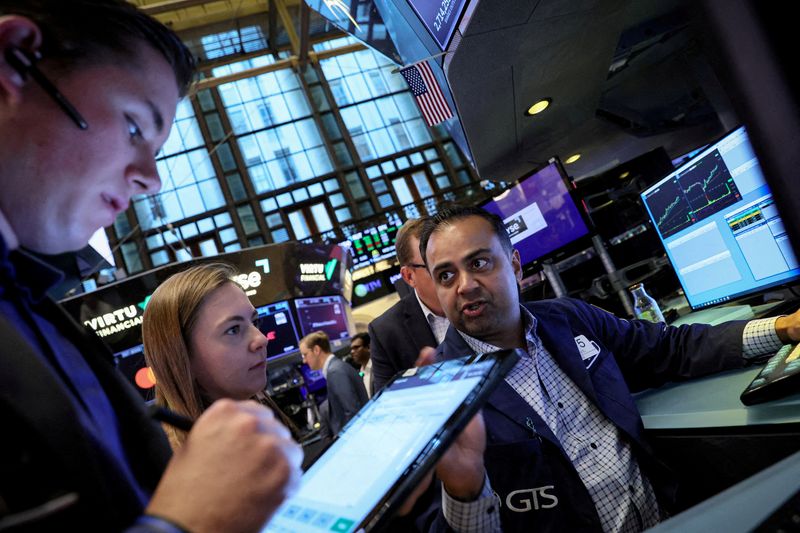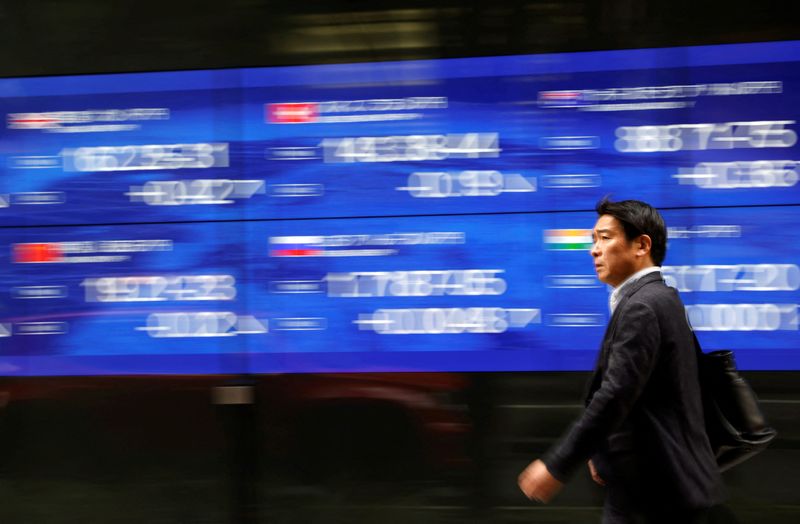By Herbert Lash
NEW YORK (Reuters) -Global stocks slipped on Wednesday, a day before the release of key U.S. inflation data, while the dollar eased after data showed the Chinese economy slipped into deflation last month.
Wall Street traded lower on investor caution a day before the Consumer Price Index report for June. Some analysts believe data could show inflation bumped higher, despite mostly dovish comments from Federal Reserve officials this week.
CPI is forecast to show headline inflation picking up slightly in July to an annual 3.3%, while the core rate is seen unchanged at 4.8%, according to a Reuters poll of economists.
A broad sell-off on Tuesday was sparked by Moody's (NYSE:MCO) ratings cut to 10 small and mid-sized U.S. banks which cast a pall over the market facing high equity valuations and rising interest rates after Fitch's surprise downgrade of U.S. government debt.
"We've had such a run over the last few months. We had a lack of any market consolidation, so we're getting that now," said James Ragan, director of wealth management research at D.A. Davidson in Seattle.
"We're still rotation away from the big technology-centric sector," he said.
The top contributor to Wall Street's decline was Nvidia (NASDAQ:NVDA), followed closely by the other "Magnificent Seven" megacap stocks that drove this year's stock rally.
MSCI's gauge of stocks across the globe closed down 0.30%, while on Wall Street, the Dow Jones Industrial Average fell 0.54%, the S&P 500 lost 0.70% and the Nasdaq Composite dropped 1.17%.
In Europe, the pan-regional STOXX 600 index closed up 0.43% after Italy said a new tax on banking profit would not exceed 0.1% of a bank's assets, reassuring investors who had expected a charge of as much as 0.5%. However, questions remain about a global trend of taxing bank windfalls.
"The burden-sharing of the costs and benefits from higher rates has a habit of becoming a political issue," Deutsche Bank (ETR:DBKGn) strategist Jim Reid said.
European bank stocks rose 1.01% and Italy's FTSE MIB share index gained 1.31%.
Data from China on Wednesday showed producer prices in the world's major manufacturing hub fell for a 10th consecutive month in July. China's consumer price index also tipped into deflation for the first time since February 2021. The data followed disappointing trade figures out of China a day earlier.
China's post-pandemic recovery has slowed as demand at home and abroad weakened, leading to fears the country is entering an era of slow growth akin to the period of Japan's "lost decades," when consumer prices and wages stagnated for a generation.
Alleged dollar selling by state-owned Chinese banks helped the yuan rally from a one-month low, dealers said. The Chinese central bank's stronger-than-expected exchange-rate fixing before the open signaled its discomfort with the yuan's recent declines.
The dollar fell 0.15% against the yuan to 7.2260, and the dollar index, a measure of its performance against six others, slid 0.04% to 102.46, reversing Tuesday's rise.
Treasury yields dipped in choppy trade before the U.S. Treasury Department sold $38 billion in 10-year notes to yield 3.999%, a test of demand for government debt after yields rose sharply last week.
The yield on the benchmark note later fell 0.6 basis points to 4.018%, and on two-year notes, which typically reflect interest rate expectations, rose 5 basis points to 4.808%.
Oil hit new peaks with the global Brent benchmark hitting its highest since January after a steep drawdown in U.S. fuel stockpiles and tighter supply owing to Saudi and Russian output cuts offset concerns about slow demand from China.
U.S. crude futures rose $1.48 to $84.40 a barrel, while Brent settled up $1.38 at $87.55, its highest since Jan. 27.

Gold prices slipped as investors stayed on the sidelines ahead of U.S. inflation data.
U.S. gold futures settled 0.5% lower at $1,950.60 per ounce.
